St. Francis of Assisi Weekly Reflections

Serving Others Through Love
06-26-2022Weekly ReflectionWe Celebrate Worship Resource, Vol. 47, No. 2As Jesus made his way to Jerusalem and the destiny he had chosen to face, the cost of his faithfulness to his Father and that of his mission were coming into sharp focus. This provides some context for Jesus’ high expectations of potential disciples at this time. Jesus belongs about his Father’s business. He did so when visiting Jerusalem as a boy. He will now when returning to Jerusalem as a man. Each time he had to leave his own mother, family, and home. He expects the same of his disciples. Discipleship—for them, for us—is a one-way street. There may be lots of good reasons to backtrack for something important or take a detour when something comes up, but discipleship demands a steady commitment to a goal. The goal is eternal life with the Lord and the commitment we entered into in baptism. We didn’t know what we were getting into then and we don’t know what’s in store for us now. Paul gives us a good roadmap as any when he explains to the Galatians that to love your neighbor as yourself means to “serve one another through love” (5:13). Serving one another through love keeps us on that road. So we continue forward, trusting in our collective mission, our eyes on the fullest expression of love, who is our hope and our final destiny.
How will you serve someone else through love this week?
Sirviendi al Prójimo por Amor
Mientras Jesús se dirigía a Jerusalén y al destino que había elegido enfrentar, el costo de su fidelidid a su Padre y el de su misión se estaban poniendo claramente en foco. Esto proporciona un contexto para las altas expectativas de Jesús de los discípulos potenciales en este momento. Jesús pertenece a los negocios de su Padre. Lo hizo cuando visitó Jerusalén cuando era niño. Lo hará ahora cuando regrese a Jerusalén como hombre. Cada vez tuvo que dejar a su propia madre, familia y hogar. Él espera lo mismo de sus discípulos. El discipulado—para ellos, para nosotros—es una calle de sentido único. Puede haber muchas buenas razones para dar marcha atrás en algo importante o tomar un desvío cuando surge algo, pero el discipulado exige un compromiso constante con una meta. La meta es la vida eterna con el Señor y el compromiso que asumimos en el bautismo. No sabíamos en lo que nos estábamos metiendo entonces y no sabemos lo que nos espera ahora. Pablo nos da un buen mapa cuando les explica a los gálatas que amar a tu prójimo como a ti mismo significa “servirnos los unos a los otros por amor” (5:13). Servirnos unos a otros a través del amor nos mantiene en ese camino. Así seguimos adelante, confiados en nuestra misión colectiva, con la mirada puesta en la expresión más plena del amor, que es nuestra esperanza y nuestro destino final.
¿Cómo servirás a tu prójimo a través del amor esta semana?

The Kingdom of God is Among You
06-19-2022Weekly ReflectionWe Celebrate Worship Resource, Vol. 47, No. 2Luke tells us that before multiplying the loaves and fishes, “Jesus spoke to the crowds about the kingdom of God” (9:11). That’s no surprise. In Luke’s Gospel, Jesus spoke about the kingdom of God constantly. It is the inheritance of the poor (6:20). It is filled with good news (8:1). It is like a mustard seed: tiny, but producing a huge bush (13:19). It is like a sprinkle of yeast that leavens a whole batch of dough (13:21). It is where those who were last will be first (13:30). It is to be accepted like a child (18:17). It is more difficult for a rich person to enter than a camel to pass through a needle’s eye (18:25). It is promised to the good thief on the cross (23:43). Today it is here among thousands of people, hungry and tired at the end of a long day, lacking any food but five loaves and two fish, but where after Jesus blessed these ridiculously meager provisions and the disciples passed them out, they ate and ate and were satisfied and still had more. Perhaps some in the crowd realized that this was exactly what Jesus had just spoken about. “For behold, the kingdom of God is among you” (17:21).
How have you experienced the kingdom of God among you?
El Reino de Dios esta entre Ustedes
Lucas nos dice que antes de multiplicar los panes y los peces, “Jesús habló del Reino de Dios a la multitud” (9:11). Eso no es sorpresa. En el Evangelio de Lucas, Jesús habla constantemente del Reino de Dios. Es la herencia de los pobres (6:20). Está lleno de buenas noticias (8:1). Es como una semilla de mostaza: diminuta, pero que produce una gran zarza (13:19). Es como un poco de levadura que fermenta toda una masa (13:21). Es donde los últimos serán los primeros (13:30). Es ser aceptado como un niño (18:17). Es más difícil que entre un rico que pasar un camello por el ojo de una aguja (18:25). Se promete al buen ladrón en la cruz (23:43). Hoy está aquí entre miles de personas, hambrientas y cansadas al final de un largo día, sin más alimento que cinco panes y dos pescados, pero después de que Jesús bendijo estas provisiones ridículamente escasas y los discípulos las repartieron, comieron y comieron y estaban satisfechos y aún tenían más. Quizás algunos en la multitud se dieron cuenta de que esto era exactamente de lo que Jesús acababa de hablar. “Porque he aquí, el reino de Dios está entre ustedes” (17:21).
¿Cómo has experimentado el Reino de Dios “entre ustedes”?

Father, Son and Holy Spirit
06-12-2022Weekly ReflectionWe Celebrate Worship Resource, Vol. 47, No. 2We tend to think of the three members of the Holy Trinity as having three distinct roles. God the Father is our Creator, God the Son is our Redeemer, and God the Holy Spirit is our Sanctifier. But the distinctions are not so clear-cut in reality. Like the wisdom of God, personified by the author of Proverbs, the Spirit “was poured forth, at the first, before the earth” (8:23). John himself tells us, “In the beginning was the Word, and the Word was God” (1:1). Though the Son and Holy Spirit did not come to us until much later, God has always been Triune. What’s more, as Jesus tells his disciples, “Everything that the Father has is mine; ...(the Holy Spirit) will take from what is mine” (John 16:15). The members of the Trinity give completely of themselves to each other. This perfect generosity is a sign of the Triune love of God, a love that has, in turn, been given to us, “poured out into our hearts through the Holy Spirit” (Romans 5:50).
How can you express the generosity of the Trinity in the way you treat others?
Padre, Hijo y Espritu Santo
Tendemos a pensar que los tres miembros de la Santísima Trinidad tienen tres roles distintos. Dios Padre es nuestro Creador, Dios Hijo es nuestro Redentor y Dios Espíritu Santo es nuestro Santificador. Pero las distinciones no son tan claras en la realidad. Como la sabiduría de Dios, personificada por el autor de Proverbios, el Espíritu “fue derramado, desde el principio, antes de que la tierra existiera” (8:23). El mismo Juan nos dice: “En el principio era el Verbo, y el Verbo era Dios” (1:1). Aunque el Hijo y el Espíritu Santo no vinieron a nosotros hasta mucho después, Dios siempre ha sido Trino. Es más, como dice Jesús a sus discípulos: “Todo lo que tiene el Padre es mío; ...(el Espíritu Santo) tomará de lo mío” (Juan 16:15). Los miembros de la Trinidad se dan completamente unos a otros. Esta generosidad perfecta es un signo del amor trino de Dios, un amor que, a su vez, nos ha sido dado a nosotros, “derramado su amor en nuestros corazones por el Espíritu Santo” (Romanos 5:50).
¿Cómo puedes expresar la generosidad de la Trinidad en la forma en que tratas a los demás?
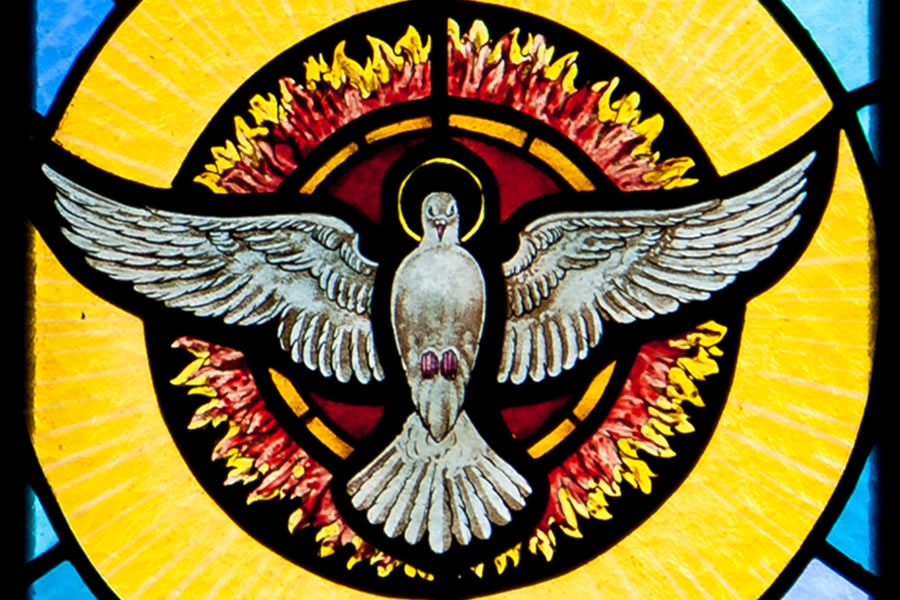
Peace be with You
06-05-2022Weekly ReflectionWe Celebrate Worship Resource, Vol. 47, No. 2Today we hear only of the Holy Spirit coming down upon the apostles, but also of the witnesses in the streets of Jerusalem. People from all over the known world could hear the disciples speaking in their own tongue. The author of Acts goes on to say that after listening to Peter thousands of people chose to be baptized. The Holy Spirit came down and transformed the lives of the apostles, but immediately went on to transform the lives of thousands of others. We are those witnesses now. Like them, we received the Holy Spirit at baptism. Like them, we are diverse, with varied backgrounds, speaking different languages. The Holy Spirit also helps us understand each other and recognize the way we each express the glory of God. The Holy Spirit Helps us understand the cries of the family at the border fleeing fear and desperation, the hopes of the young person desperate for an opportunity, the pleas of the older person who was just laid off, the grief of those who lost family and friends in the pandemic. With the Holy Spirit, we gain the ability to truly understand each other, to bridge our differences—differences that flow from the mighty acts of God—while recalling the first word the risen Lord pronounced to his disciples: Peace.
How can you express the peace that Jesus left us to those with whom you have differences?
La paz este con ustedes
Hoy escuchamos no solo que el Espíritu Santo descendió sobre los apóstoles, sino también de los testigos en las calles de Jerusalén. Personas de todo el mundo conocido podían escuchar a los discípulos hablando en su propia lengua. El autor de Hechos continúa diciendo que después de escuchar a Pedro, miles de personas optaron por bautizarse. El Espíritu Santo descendió y transformó la vida de los apóstoles, pero inmediatamente pasó a transformar la vida de miles de personas. Nosotros somos esos testigos ahora. Como ellos, recibimos el Espíritu Santo en el bautismo. Al igual que ellos, somos diversos, con antecedentes variados, hablamos idiomas diferentes. El Espíritu Santo también nos ayuda a entendernos unos a otros ya reconocer la forma en que cada uno expresa la gloria de Dios. El Espíritu Santo nos ayuda a comprender los gritos de la familia en la frontera que huye del miedo y la desesperación, las esperanzas del joven desesperado por una oportunidad, las súplicas del anciano que acaba de ser despedido, el dolor de quien perdió a su familia y amigos en la pandemia. Con el Espíritu Santo, adquirimos la capacidad de entendernos verdaderamente unos a otros, de unir nuestras diferencias, diferencias que se derivan de los actos poderosos de Dios, mientras recordamos la primera palabra que el Señor resucitado pronunció a sus discípulos: Paz.
¿Cómo puedes expresar la paz que Jesús nos dejó a aquellos con quienes tienes diferencias?
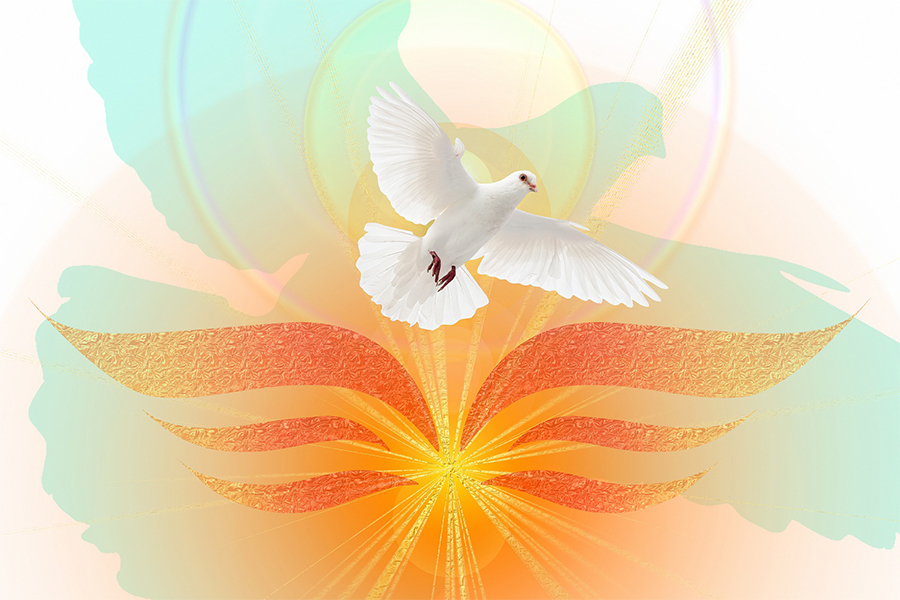
Allow the Holy Spirit to Guide You
05-29-2022Weekly ReflectionWe Celebrate Worship Resource, Vol. 47, No. 2"Go!...But wait!" Those are not Jesus' actual words, but according to what Luke reported in his Gospel, and in Acts of the Apostles, it’s a reasonable paraphrase. He commanded his disciples to preach the kingdom of god and repentance for the forgiveness of sins to all the nations, to the ends of the earth. But then he told them to wait for the Holy Spirit, who would give them “power from on high” (Luke 24:49). The disciples, Peter in particular, had a history of acting impetuously or misunderstanding Jesus’ words. The Holy Spirit would give them guidance and understanding, enabling them to discern God’s will and God’s work in the world. The Holy Spirit would also give them the courage they needed to be the Lord’s witnesses, even in the face of hostility or indifference. Jesus knew it would not be easy. The religious and political authorities who persecuted Jesus would not welcome his followers bearing witness to his resurrection. We are now those witnesses. With help from the Holy Spirit, we bear witness to the world, even when it is not easy, even when we too face opposition for speaking out for justice, for truth, for our conscience.
How can the Holy Spirit guide you and fortify you for bearing witness?
Deja que el Espíritu Santo te Guie
¡Ve!...¡ Pero espera!" Esas no son las palabras de Jesús, pero de acuerdo con lo que Lucas informó en su Evangelio y en los Hechos de los Apóstoles, es una paráfrasis razonable. Mandó a sus discípulos a predicar el reino de Dios y el arrepentimiento para el perdón de los pecados a todas las naciones, hasta los confines de la tierra. Pero luego les dijo que esperaran al Espíritu Santo, quien les daría “fuerza de lo alto” (Lucas 24:49). Los discípulos, Pedro en particular, tenían un historial de actuar impetuosamente o malinterpretar las palabras de Jesús. El Espíritu Santo les daría guía y entendimiento, capacitándolos para discernir la voluntad de Dios y la obra de Dios en el mundo. El Espíritu Santo también les daría el valor que necesitaban para ser testigos del Señor, incluso frente a la hostilidad o la indiferencia. Jesús sabía que no sería fácil. Las autoridades religiosas y políticas que persiguieron a Jesús no aceptaron a sus seguidores dando testimonio de su resurrección. Ahora somos esos testigos. Con la ayuda del Espíritu Santo, damos testimonio al mundo, incluso cuando no es fácil, incluso cuando también nosotros enfrentamos oposición por hablar por la justicia, por nuestra conciencia.
¿Cómo puede el Espíritu Santo guiarte y fortalecerte para dar testimonio?

Holy Spirit Guide Us to Peace
05-20-2022Weekly ReflectionWe Celebrate Worship Resource, Vol. 47, No. 2We will... make our dwelling with him (or her)” (John 14:23), Jesus promises his disciples in his conversation with them at he Last Supper. He tells them that the Holy Spirit will come after he leaves. The Holy Spirit dwells with us, guides us, counsels us, advocates for us, and gives us peace. The leaders of the early church relied on the Holy Spirit when facing issues Jesus had not explicitly addressed. For instance, Paul and Barnabas asked them to decided what Jewish practices were necessary for Gentile Christians. A requirement of circumcision would have been a burden to men with no tradition of the practice. More significantly, it relegated women to second-class status. Guided by the Holy Spirit, the decision they made brought peace to the newly baptized Gentiles. Two thousand years later, the Holy Spirit still dwells with us and guides us. May we allow the Holy Spirit to guide us to peace, the peace that Jesus gave to his disciples with some of the last words before he died and in his first words to them after he rose.
How can you bring the peace of the Holy Spirit to your family, your community, and the world?
Espíritu Santo Guíanos hacia la Paz
"Haremos... haremos nuestra morada con él (o ella)” (Juan 14:23), Jesús promete a sus discípulos en su conversación con ellos en la Última Cena. Él les dice que el Espíritu Santo vendrá después de que él se vaya. El Espíritu Santo mora con nosotros, nos guía, nos aconseja, nos aboga y nos da la paz. Los líderes de la iglesia primitiva confiaban en el Espíritu Santo cuando enfrentaban problemas que Jesús no había abordado explícitamente. Por ejemplo, Pablo y Bernabé les pidieron que decidieran qué prácticas judías eran necesarias para los cristianos gentiles. Un requisito de la circuncisión habría sido una carga para los hombres sin tradición de la práctica. Más significativamente, relegó a las mujeres a un estatus de segunda clase. Guiados por el Espíritu Santo, la decisión que tomaron trajo paz a los gentiles recién bautizados. Dos mil años después, el Espíritu Santo todavía mora con nosotros y nos guía. Permitamos que el Espíritu Santo nos guíe hacia la paz, la paz que Jesús les dio a sus discípulos con algunas de sus últimas palabras antes de morir y en sus primeras palabras después de resucitar.
¿Cómo puedes traer la paz del Espíritu Santo a tu familia, tu comunidad y el mundo?
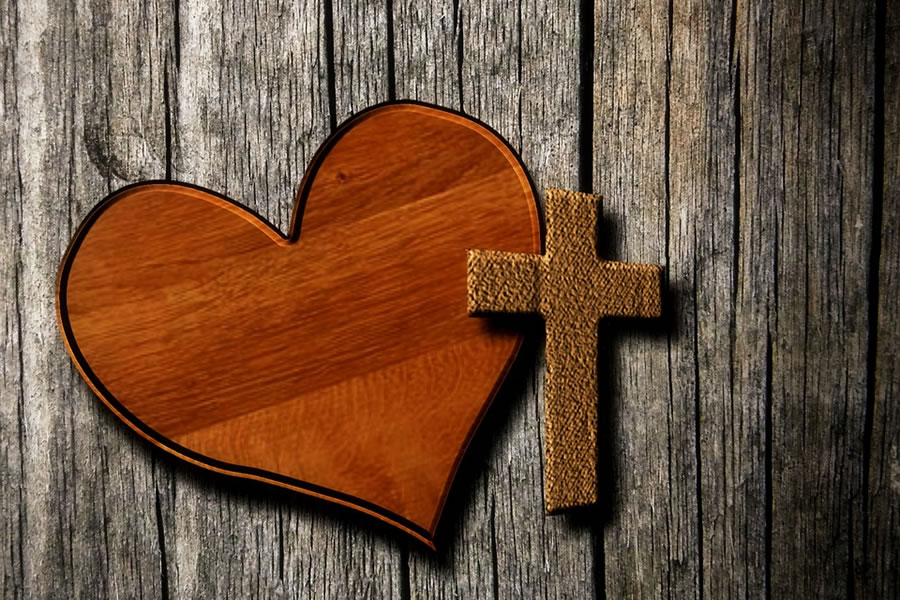
Love One Another
05-15-2022Weekly ReflectionWe Celebrate Worship Resource, Vol. 47, No. 2"As I have loved you, so you also should love one another” (John 13:34). At first hearing, it sounds wonderful. Love, afte all, is a beautiful emotion. But love is more than warm affection for someone else; it is an unselfish concern for that other person. Loving one another is especially challenging considering the context of this conversation. Note the first five words of this passage: “When Judas had left them” (13:31). This scene takes place at the Last Supper, right after Judas has been sent away: “What you are going to do, do quickly” (13:27). Jesus has shown his love for others during his entire ministry: healing the sick, driving out demons, forgiving sinners, and caring for his disciples. But now in giving his life for humankind, he reveals the true depth of his love. It is this completely unselfish act, following the will of his Father and forgiving the sins of all humanity, that also provides us a model of loving one another. It is in loving one another, unselfishly and unconditionally, that we reveal the love of God for our neighbor.
How can you bring God’s love to someone who needs it?
Amense Unos a los Otros
"Que se los unos a los otros, comoyo los he amado” (Juan 13:34). A primera vista, suena maravilloso. El amor, después de todo, es una emoción hermosa. Pero el amor es más que un cálido afecto por otra persona; es una preocupación desinteresada por esa otra persona. Amarse unos a otros es especialmente desafiante considerando el contexto de esta conversación. Note las primeras cinco palabras de este pasaje: “Cuando Judas salió del cenáculo” (13:31). Esta escena tiene lugar en la Última Cena, justo después de que Judas ha sido despedido: “Lo que vas a hacer, hazlo más pronto” (13:27). Jesús ha mostrado su amor por los demás durante todo su ministerio: sanando a los enfermos, expulsando demonios, perdonando a los pecadores y cuidando de sus discípulos. Pero ahora, al dar su vida por la humanidad, revela la verdadera profundidad de su amor. Es este acto completamente desinteresado, siguiendo la voluntad de su Padre y perdonando los pecados de toda la humanidad, lo que también nos proporciona un modelo de amor mutuo. Es amándonos unos a otros, desinteresada e incondicionalmente, que revelamos el amor de Dios por nuestro prójimo.
¿Cómo puedes llevar el amor de Dios a alguien que lo necesita?

Lays Down His Life for His Sheep
05-06-2022Weekly ReflectionWe Celebrate Worship Resource, Vol. 47, No. 2"Feed my lambs," Jesus told Peter in last Sunday’s Gospel (John 21:15). When Peter heard this he may have recalled the Gospel we hear today when Jesus described a good shepherd: “My sheep hear my voice, I know them, and they follow me” (John 10:27). Sheep recognize and respond to their shepherd’s voice—important in the ancient Near East when all the village’s sheep were kept in a common pen at night—and good shepherds have a voice that guides and comforts their own. “Tend my sheep,” Jesus later instructed Peter (21:16). Here he said, “I give them eternal life, and they shall never perish” (10:28). The disciples must have realized that he was speaking of them. Good shepherds care for their sheep so that they have healthy, happy lives, but the Good Shepherd ensures that those healthy, happy lives will never end. “Feed my sheep,” Jesus commanded Peter (21:17). Perhaps he remembered Jesus saying, “No one can take them out of my hand,” assuring each member of the flock of his lasting protection (10:28). When Jesus commissioned Peter to be a good shepherd, Peter could think back to this day, when Jesus described that role.
How has the Good Shepherd helped you feel loved, secure, and comforted?
Da Su Vida por Las Ovejas
"Apacieta mis corderos", le dijo Jesús a Pedro en el Evangelio del domingo pasado (Juan 21:15). Cuando Pedro escuchó esto, pudo haber recordado el Evangelio que escuchamos hoy cuando Jesús describió a un buen pastor: “Mis ovejas oyen mi voz, yo las conozco y me siguen” (Juan 10:27). Las ovejas reconocen y responden a la voz de su pastor— importante en el antiguo Cercano Oriente cuando todas las ovejas del pueblo se mantenían en un corral común por la noche—y los buenos pastores tienen una voz que guía yconsuela a los suyos. “Pastorea mis ovejas”, instruyó Jesús más tarde a Pedro (21:16). Aquí dijo: “Yo les doy vida eterna, y no perecerán jamás” (10:28). Los discípulos deben haberse dado cuenta de que estaba hablando de ellos. Los buenos pastores cuidan de sus ovejas para que tengan una vida sana y feliz, pero el Buen Pastor se asegura de que esa vida sana y feliz nunca termine. “Apacienta mis ovejas”, ordenó Jesús a Pedro (21:17). Tal vez recordó a Jesús diciendo: “Nadie me las puede quitar de la mano”, asegurando a cada miembro del rebaño su protección duradera (10:28). Cuando Jesús comisionó a Pedro para que fuera un buen pastor, Pedro podía recordar este día, cuando Jesús describió ese papel.
¿Cómo te ha ayudado el Buen Pastor a sentirte amado, seguro y consolado?

Fisher of Believers
05-01-2022Weekly ReflectionWe Celebrate Worship Resource, Vol. 47, No. 2"I am going fishing," Peter tells the other disciples (John 21:3). Of course he is. It’s his trade, after all. His home is the sea. Especially in the morning he wanted to be out on the water, far from any rooster, whose crowing at sunrise would still bring him to tears. He could not stand the guilt pressing down upon him at the beginning of every day. But Easter wasn’t just the start of a new day for Peter and the disciples. It was the start of an entire new life. In the first reading we hear how successful he has become at teaching and preaching the gospel. How did he get from the shame of having denied his Lord to leading the apostles to teach in his name? This passage gives us a clue. Three times he had denied the Lord. Now three times he confesses his love for him. No matter which words are used for love or care or sheep, Peter commits himself to be the shepherd in Jesus’ place. Forgiven and commissioned, now he truly will fish for believers.
How would you answer Jesus’ question to Peter? How can you follow him and tend his sheep?
Pescador de Creyentes
"Voy a pescar", otros discípulos (Juan 21:3). Claro que lo es. Es su oficio, después de todo. Su hogar es el mar. Especialmente en la mañana que quería estar en el agua, lejos de cualquier gallo, cuyo canto al amanecer todavía lo llevaría a las lágrimas. No podía soportar la culpa presionando sobre él al comienzo de todos los días. Pero Pascua no fue solo el comienzo de un nuevo día para Pedro y los discípulos. Fue el comienzo de una nueva vida entera. En la primera lectura, escuchamos lo exitoso que se ha convertido en enseñar y predicar el Evangelio. ¿Cómo llegó de la vergüenza de haber negado a su Señor a dirigir a los apóstoles a enseñar en su nombre? Este pasaje nos da una pista. Tres veces le había negado al Señor. Ahora tres veces confiesa su amor por él. No importa qué palabras se usen para el amor o el cuidado o las ovejas, Pedro se compromete a ser el pastor en el lugar de Jesús. Perdonado y comisionado, ahora realmente pescará a los creyentes.
¿Cómo responderías a la pregunta de Jesús a Pedro? ¿Cómo puedes seguirlo y cuidar sus ovejas?
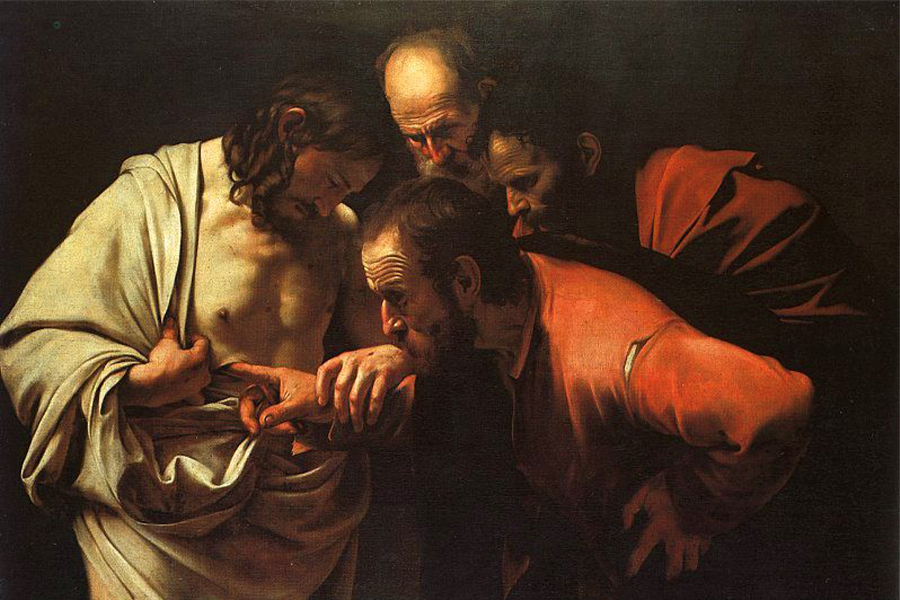
Doubt No More!
04-24-2022Weekly ReflectionWe Celebrate Worship Resource, Vol. 47, No. 2Defiant Thomas. Doubtung, to be sure, but also defiant in his refusal to believe. Just imagine ten close friends all telling you the same story. But you don’t believe it. You insist on seeing for yourself. Certainly this was an incredible phenomenon—someone returning from the dead—but your closest friends all insist they saw him in the flesh. Is that not enough? Not for Thomas. He insists that he needs to touch Jesus’ wounds to convince himself that he’s not just seeing things. So he shows up the following week, skeptical, but curious. When Jesus returns, just seeing him and hearing his voice brings Thomas to confess Jesus’ presence and divinity in the boldest possible terms: “My Lord and my God!” (John 20:28). Defiant Thomas defiant no longer. He cannot deny the truth standing in front of him. We all have a bit of Thomas in us. Skeptical, even in the face of eyewitness testimony, perhaps even defiant in our disbelief. But just as for Thomas, our doubts can be overcome. But we have to be willing to look again.
Can you recall a time when you changed your mind about something important?
¡No Dudes Más!
Thomás desafiante. Dudoso, pero también desafiante en su negativa a creer. Imagínese diez amigos cercanos que le cuentan la misma historia. Pero no le crees. Insistes en verlo por ti mismo. Ciertamente, este fue un fenómeno increíble, alguien que regresa de entre los muertos, pero todos tus amigos más cercanos insisten en que lo vieron en persona. ¿No es eso suficiente? No para Tomás. Insiste en que necesita tocar las heridas de Jesús para convencerse de que no solo está viendo cosas. Así que aparece la semana siguiente, escéptico, pero curioso. Cuando Jesús regresa, solo verlo y escuchar su voz hace que Tomás confiese la presencia y la divinidad de Jesús en los términos más audaces posibles: “¡Señor mío y Dios mío!” (Juan 20:28). Desafiante Tomás ya no desafiante. No puede negar la verdad que está frente a él. Todos tenemos un poco de Tomás en nosotros. Escépticos, incluso ante el testimonio de testigos oculares, tal vez incluso desafiantes en nuestra incredulidad. Pero al igual que con Tomás, nuestras dudas pueden ser superadas. Pero tenemos que estar dispuestos a mirar de nuevo.
¿Puedes recordar un momento en que cambiaste de opinión sobre algo importante?

Redemption at Your Fingertips
04-17-2022Weekly ReflectionWe Celebrate Worship Resource, Vol. 47, No. 2"This is the day the Lord had made," we sing in today’s responsorial psalm (Psalm 118:21), and indeed we are filled with Easter joy, for the Lord has defeated death and saved us from the power of sin. Out of love and mercy, Jesus accepted the cross and suffered in an absolutely terrible human way: betrayed, abandoned, tortured, and put to death. But death is not the end. The joy of Easter is the joy of the Beloved Disciple sprinting to the empty tomb, seeing the discarded burial cloths, and believing. New life has been found on the other side of the cross. So too is it for us. The crosses we carry obscure but can never fully conceal the new life that lies just beyond. And so today we rejoice, because Jesus Christ has been raised to new life. We rejoice because Jesus Christ triumphed over death not by avoiding human suffering and humiliation, but by freely accepting it. We rejoice because out of love for you and me Jesus Christ has saved us from the captivity of sin, from the meaninglessness of suffering, and from the finality of death. Throughout time and across every boundary, for those who run to him and for those who have turned their back on him, Jesus stands ready to forgive, always ready to embrace. We rejoice today, to be sure, but we rejoice every day, for our redemption is won forever, and for that “let us rejoice and be glad” (118:24).
Can you visualize the redemption lying beyond the crosses you bear?
Redencíon a tu Alcance
"Este es el día en que actuó el Señor," cantamos enel salmo responsorial de hoy (Salmo 118:21), y en verdad estamos llenos de alegría pascual, porque el Señor ha vencido la muerte y nos ha salvado del poder del pecado. Por amor y misericordia, Jesús aceptó la cruz y sufrió de una manera humana absolutamente terrible: traicionado, abandonado, torturado y condenado a muerte. Pero la muerte no es el final. El gozo de la Pascua es el gozo del Discípulo Amado que corre hacia la tumba vacía, ve los paños del entierro desechados y cree. Se ha encontrado nueva vida al otro lado de la cruz. Así también es para nosotros. Las cruces que llevamos oscurecen, pero nunca pueden ocultar por completo, la nueva vida que se encuentra más allá. Y por eso hoy nos regocijamos, porque Jesucristo ha resucitado a una vida nueva. Nos regocijamos porque Jesucristo triunfó sobre la muerte no evitando el sufrimiento y la humillación humana, sino aceptándolos libremente. Nos regocijamos porque por amor a ti y a mí Jesucristo nos ha salvado de la cautividad del pecado, de la insensatez del sufrimiento y de la finalidad de la muerte. A lo largo del tiempo y a través de todos los límites, para los que corren hacia él y para los que le han dado la espalda, Jesús está dispuesto a perdonar, siempre dispuesto a abrazar. Nos regocijamos hoy, sin duda, pero nos regocijamos todos los días, porque nuestra redención se ganó para siempre, y por eso “sea nuestra alegría y nuestro gozo.” (118:24)
¿Puedes visualizar la redención que yace más allá de las cruces que llevas?

When in Fear, Turn to God
04-10-2022Weekly ReflectionWe Celebrate Worship Resource, Vol. 47, No. 1Fear is a difficult emotion to overcome. When Jesus’ disciples shouted words of praise and joy as he rode into Jerusalem, some of the Pharisees, fearful that the commotion could arouse the authorities, pleaded with Jesus to rebuke them. Peter, fearing that he might be arrested and led away as Jesus was, denied knowing anything about him. Herod feared the loss of his influence and power. Pilate feared a revolt. The criminal who demanded that Jesus save the three of them feared death. But we also see those who find a way to overcome fear in today's scripture passage. Isaiah turns to the Lord for help and withstands the abuse he receives. Jesus, despite his agony in the garden, resolves to follow his Father’s will no matter what. The other criminal crucified with Jesus, even while hanging on his own cross, acknowledges the injustice of Jesus’ sentence and asks for his mercy. The centurion at the foot of the cross testifies to Jesus’ innocence, certainly not what authorities wanted to hear. Even Joseph of Arimathea has to overcome fear in asking for Jesus’ body so that it could be laid in a proper tomb. They did what they knew was right and good despite their fears. Note that when Jesus was suffering in Gethsemane, he did one thing: he turned to his Father in prayer. He did the same on the cross. May we as well, seeking the grace to overcome our fears and to follow God’s will no matter the cost.
How have you given in to fear? What fears do you pray to overcome?
Cuando tenga Miedo, Vuelva a Dios
El miedo es una emoción difícil de superar. Cuando los discípulos de Jesús gritaron palabras de alabanza y alegría mientras él entraba a caballo en Jerusalén, algunos de los fariseos, temerosos de que la conmoción pudiera despertar a las autoridades, le suplicaron a Jesús que los reprendiera. Pedro, temiendo que lo arrestaran y se lo llevaran como Jesús, negó saber algo acerca de él. Herodes temía perder su influencia y poder. Pilato temía una revolución. El criminal que exigió que Jesús los salvara a los tres temía la muerte. Pero también vemos a aquellos que encuentran una manera de vencer el miedo en el pasaje de las Escrituras de hoy. Isaías recurre al Señor en busca de ayuda y resiste el abuso que recibe. Jesús, a pesar de su agonía en el jardín, decide seguir la voluntad de su Padre pase lo que pase. El otro criminal crucificado con Jesús, aun colgado de su propia cruz, reconoce la injusticia de la sentencia de Jesús y pide su misericordia. El centurión al pie de la cruz da testimonio de la inocencia de Jesús, ciertamente no lo que las autoridades querían escuchar. Incluso José de Arimatea tuvo que vencer el miedo al pedir el cuerpo de Jesús para que pudiera ser colocado en una tumba adecuada. Hicieron lo que sabían que era correcto y bueno a pesar de sus miedos. Tenga en cuenta que cuando Jesús estaba sufriendo en Getsemaní, hizo una cosa: se volvió a su Padre en oración. Hizo lo mismo en la cruz. Que nosotros también busquemos la gracia de vencer nuestros miedos y seguir la voluntad de Dios sin importar el costo.
¿Cómo has cedido al miedo? ¿Qué miedos oras para vencer?
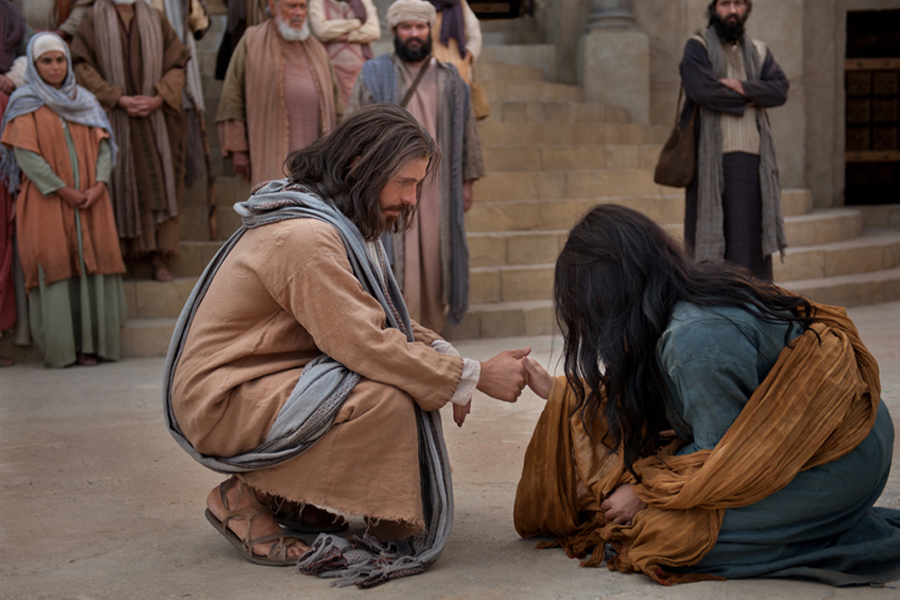
Be Merciful to Others
04-03-2022Weekly ReflectionWe Celebrate Worship Resource, Vol. 47, No. 1Last Sunday we heard the parable of the prodigal son, who squandered his inheritance on, among other things, illicit activity. Today Jesus is confronted with a woman who was caught in similar illicit activity and for whom the consequences are much more severe. The scribes and Pharisees are prepared to stone her, per their reading of the law. Jesus, responding with the mercy of the prodigal son’s father, saves her life by reminding them all that none of them was without sin. After a moment or two, each one dropped his weapon and walked away, acknowledging that, righteous as they may have been, they were sinful as well. It’s self-awareness that eluded the older brother last Sunday, who insisted he always served his father and never disobeyed him, blind to the resentment that he had so obviously built up within himself. On the other hand, each and every person in today’s crowd is moved to make this act of life-restoring mercy, allowing Jesus to send the woman onward, wrapped in the arms of forgiving grace.
When have you felt mercy that allowed you to move on? Whom must you forgive now?
Ten Misericordia con los Demás
El domingo pasado escuchamos la parábola del hijo pródigo, que dilapidó su herencia en, entre otras cosas, actividades ilícitas. Hoy Jesús se enfrenta a una mujer que fue sorprendida en una actividad ilícita similar y para quien las consecuencias son mucho más graves. Los escribas y fariseos están preparados para apedrearla, según su lectura de la ley. Jesús, respondiendo con la misericordia del padre del hijo pródigo, le salva la vida recordándoles a todos que ninguno de ellos estaba libre de pecado. Después de un momento o dos, cada uno soltó su arma y se alejó, reconociendo que, por justos que hayan sido, también eran pecadores. Es la autoconciencia lo que eludió al hermano mayor el domingo pasado, quien insistió en que siempre sirvió a su padre y nunca lo desobedeció, ciego al resentimiento que obviamente había acumulado dentro de sí mismo. Por otro lado, todas y cada una de las personas de la multitud de hoy están movidas a hacer este acto de misericordia que restaura la vida, permitiendo que Jesús envíe a la mujer adelante, envuelta en los brazos de la gracia perdonadora.
¿Cuándo has sentido misericordia que te permitió seguir adelante? ¿A quién debes perdonar ahora?